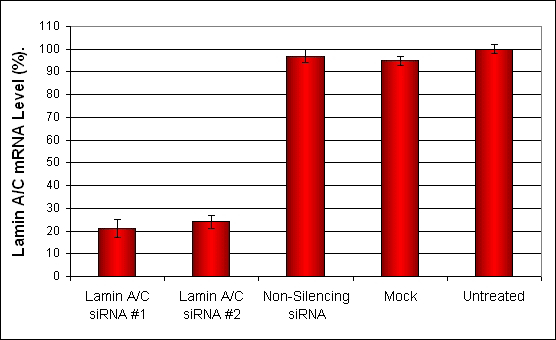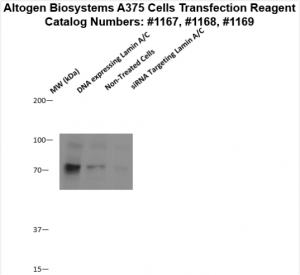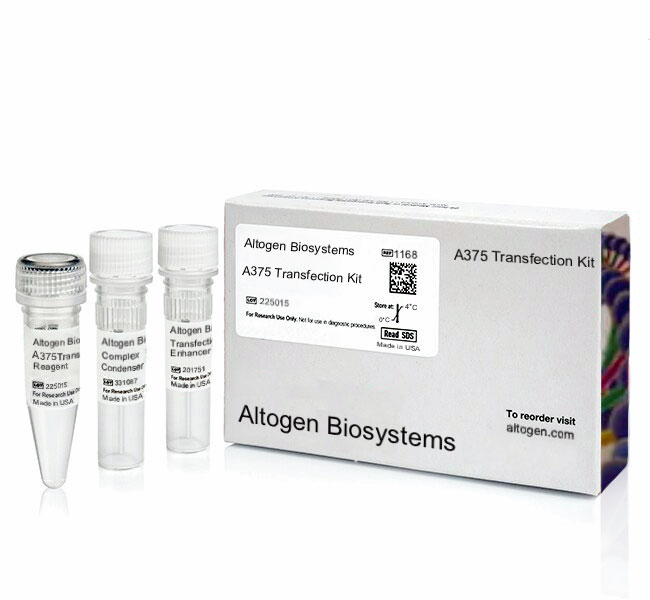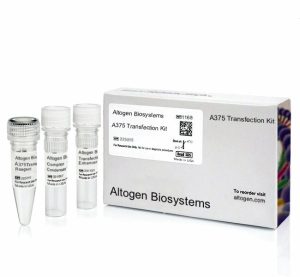Description
Purchase Orders: Click “Add to Cart” button to order, then email PO to orders@altogen.com.
Product Availability: In Stock.
Transfection Reagent for A375 Cells (Melanoma Cells, CRL-1619)
-
A nanoparticle-based liposome formulation
-
Transfection protocols provided for transfection of proteins, DNA, mRNA, siRNA, shRNA and microRNA
-
Transfection Enhancer reagent provided with the kit
-
Produce higher level of recombinant protein expression with minimal disruption of normal cell function
-
Generate physiologically relevant data you can trust
-
Effective for plasmid DNA/siRNA co-transfection
-
Easy-to-use transfection protocol with reproducible results
-
Low cytotoxicity
-
Download in vitro A375 transfection protocol: [PDF]
- Download A375 CRISPR/Cas9 transfection protocol: [PDF]
- Download PowerPoint presentation for A375 cells transfection kit: [PPT]
- UPC/GTIN/EAN: 860002089714
-
Brand: ALTOGEN®, developed and manufactured by Altogen Biosystems
Transfection Efficiency:
Reagent exhibits at least 76% transfection efficiency of siRNA delivery. Transfection efficiency was determined by real-time RT-PCR.
Product Description:
Pre-optimized transfection kit for high transfection efficiency of A375 cells, a human malignant melanoma cell line that was originally isolated from a metastatic lesion in the skin of a patient with melanoma.
Transfection Protocol and SDS:
Download Altogen Biosystems Transfection Protocol: [PDF]
Download SDS: [PDF]
A375 Cell Line:
Prolonged exposure to ultraviolet (UV) radiation dramatically increases the risk of melanoma, which is among the top 10 most prevalent forms of cancer in the US, and the top 20 in the world. There will be approximately 87,000 new cases of melanoma, in the United States in 2017 alone, according to the Skin Cancer Foundation. The A-375 cell line is a useful melanoma model employed in preclinical research to develop new medicines. A-375 cells were established based on skin cells taken from a 54-year-old female patient who suffered from malignant melanoma (skin cancer). These tumorigenic cells exhibit an epithelial cell morphology and are useful as a stable transfection host. A375 can be helpful for molecular and cell biology research, mainly related to skin cancer.
A375 is a human malignant melanoma cell line that was originally isolated from a metastatic lesion in the skin of a patient with melanoma. This cell line is commonly used as a model system for studying melanoma and for evaluating potential therapies. A375 cells are known for their ability to form tumors in vivo when injected into immunodeficient mice, and they are commonly used in preclinical studies to evaluate the efficacy of potential melanoma therapies. These cells have also been used to study the molecular mechanisms underlying melanoma development and progression. A375 cells are commonly cultured as adherent monolayers and have been shown to express markers of melanocytic differentiation, such as tyrosinase and melan-A. They are also known to be sensitive to certain chemotherapeutic agents and radiation therapy, which makes them useful for studying drug resistance mechanisms and testing novel therapeutic strategies. In addition to their use as a model system for studying melanoma, A375 cells have been used to study a wide range of biological processes, including cell signaling, apoptosis, and autophagy. They have also been used to study the interactions between cancer cells and the immune system and to evaluate potential immunotherapies for melanoma.
Mutations:
| BRAF | 673 | 37 | 7 | 140453136 | 140453136 | Missense_Mutation | SNP | A | T |
| TRRAP | 8295 | 37 | 7 | 98509802 | 98509802 | Missense_Mutation | SNP | C | T |
| C4orf22 | 255119 | 37 | 4 | 81791162 | 81791162 | Missense_Mutation | SNP | C | T |
| OR10C1 | 442194 | 37 | 6 | 29408570 | 29408570 | Missense_Mutation | SNP | C | T |
| CDKN2A | 1029 | 37 | 9 | 21971153 | 21971153 | Nonsense_Mutation | SNP | C | A |
| MTOR | 2475 | 37 | 1 | 11186751 | 11186751 | Missense_Mutation | SNP | G | A |
| GABRG1 | 2565 | 37 | 4 | 46099233 | 46099233 | Missense_Mutation | SNP | G | A |
| PRPS1L1 | 221823 | 37 | 7 | 18066766 | 18066766 | Missense_Mutation | SNP | G | A |
| DDI1 | 414301 | 37 | 11 | 103908145 | 103908145 | Missense_Mutation | SNP | C | T |
| CD1D | 912 | 37 | 1 | 158151458 | 158151458 | Missense_Mutation | SNP | G | T |
| TTN | 7273 | 37 | 2 | 179596537 | 179596537 | Missense_Mutation | SNP | C | T |
Data:

Figure 1. siRNAs targeting Lamin A/C mRNA or non-silencing control siRNA were transfected into A375 cell line following the recommended protocol. At 48 hours post-transfection the cells were analyzed by qRT-PCR for Lamin A/C gene expression levels. 18S rRNA levels were used to normalize the Lamin A/C data. Values are normalized to untreated sample. Data are means ± SD (n=4).

Figure 2. Protein expression of Lamin A/C in A375 cells. DNA plasmid expressing Lamin A/C or siRNA targeting Lamin A/C were transfected into A375 cells following Altogen Biosystems transfection protocol. At 72 hours post-transfection the cells were analyzed by Western Blot for protein expression levels (normalized by total protein, 10 µg of total protein loaded per each well). Untreated cells used as a negative control.
Selected in vivo transfection product citations (ALTOGEN® IN VIVO Transfection Kits used in the following publications):
- Mol Cell Biol. 2013 33(7). SCO2 induces p53-mediated apoptosis by Thr845 phosphorylation … Madan et al [PDF]
- Hypertension. 2015 65(2):430-9. Neurokinin 3 receptor and phosphocholine transferase… Parchim et al [PDF]
- Gastroenterology. 2011 141(2) Differential type I interferon-mediated autophagic trafficking … Desai et al [PDF]
- PLoS Pathog. 2014 10(10) Exosomes from hepatitis C infected patients transmit HCV … Bukong et al [PDF]
Altogen Biosystems provides preoptimized transfection products for life science research applications. Transfection protocols are optimized for individual cancer cell lines. Altogen Biosystems developed two types of in vivo delivery kits for animal research: Tissue-targeted reagents (delivery to liver, pancreas, and kidney tissues), and broad range in vivo delivery reagents (PEG-Liposome, Nanoparticle-based, Lipid-based, and Polymer-based kits). Optimized transfection kits provide efficient intracellular delivery of proteins, DNA, RNA, and any other negatively charged molecules in vitro and in vivo. Read more about transfection technology at Altogen’s Transfection Resource. Altogen Labs provides GLP-compliant contract research studies for pre-clinical research, IND applications, and drug development. Biology CRO services include: Xenograft models, development of stable cell lines, ELISA assay development, cell-based and tissue targeted RNAi studies, safety pharm/tox assays, and other studies (visit AltogenLabs.com).
Volume Options:
- 0.5 ml (Catalog #1167)
- 1.5 ml (Catalog #1168)
- 1.5 ml CRISPR (Catalog #2102)
- 8.0 ml (Catalog #1169)
Purchase Orders: Click “Add to Cart” button to order, then email PO to orders@altogen.com.
Product Availability: In Stock.






